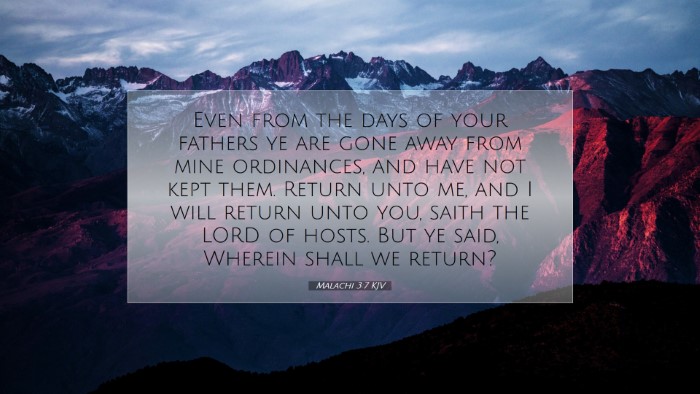Old Testament
Genesis Exodus Leviticus Numbers Deuteronomy Joshua Judges Ruth 1 Samuel 2 Samuel 1 Kings 2 Kings 1 Chronicles 2 Chronicles Ezra Nehemiah Esther Job Psalms Proverbs Ecclesiastes Song of Solomon Isaiah Jeremiah Lamentations Ezekiel Daniel Hosea Joel Amos Obadiah Jonah Micah Nahum Habakkuk Zephaniah Haggai Zechariah MalachiMalachi 3:7
Malachi 3:7 KJV
Even from the days of your fathers ye are gone away from mine ordinances, and have not kept them. Return unto me, and I will return unto you, saith the LORD of hosts. But ye said, Wherein shall we return?
Malachi 3:7 Bible Commentary
Commentary on Malachi 3:7
Verse: “Yet from the days of your fathers ye are gone away from mine ordinances, and have not kept them. Return unto me, and I will return unto you, saith the LORD of hosts. But ye said, Wherein shall we return?” (Malachi 3:7, KJV)
Introduction
In this profound verse from the book of Malachi, we witness God's call to His people, inviting them to reflect upon their relationship with Him. The significance of this text resonates deeply with pastors, students, theologians, and Bible scholars as it highlights themes of repentance, divine justice, and the covenantal relationship that God maintains with His people.
Contextual Analysis
Malachi, the last book of the Old Testament, addresses the post-exilic community of Israel. The people had returned from Babylonian captivity, yet their spiritual fervor diminished. Understanding this context is crucial as it shapes the interpretation of verse 3:7.
- Historical Context: The Jewish remnant had rebuilt the temple but struggled with complacency and skepticism regarding divine justice.
- Literary Context: Malachi employs a dialogical style, where God’s charges against the people are met with their questions—a matter of both conviction and accountability.
Verse Breakdown
“Yet from the days of your fathers ye are gone away from mine ordinances”
This phrase expresses a long-standing pattern of disobedience. Divine ordinances include the laws given through Moses, which the Israelites have neglected over generations.
“and have not kept them”
Here, Malachi emphasizes the active choice of the Israelites to abandon God’s commands. This reflects not only individual neglect but also a collective spiritual decline.
“Return unto me, and I will return unto you”
This divine promise carries with it a profound theology of restoration. God desires reconciliation and invites His people back into a covenant relationship, highlighting the conditional nature of divine favor.
“saith the LORD of hosts”
The title “LORD of hosts” emphasizes God’s sovereignty and power. It reassures the reader that the call to repentance comes from the Almighty, who commands both the heavenly and earthly realms.
“But ye said, Wherein shall we return?”
The people's response reveals spiritual apathy and a lack of self-awareness regarding their estrangement from God. This question indicates their struggle to recognize their need for repentance.
Theological Reflections
- The Nature of God’s Call: God’s invitation to return signifies His unceasing mercy and willingness to restore those who stray.
- Human Responsibility: The call to return also emphasizes the necessity of human action. Repentance is more than feeling remorse; it involves active turning towards God.
Insights from Public Domain Commentaries
Matthew Henry's Commentary
Matthew Henry points out the import of this call as a continual theme in Scripture, where God’s people are urged to return to Him after transgression. He reflects on the gravity of neglecting God’s ordinances and the necessity of reinstating their commitment to divine commands.
Albert Barnes' Notes
Barnes provides a detailed examination of the word “return,” interpreting it not only as physical return to God but also as a moral and spiritual renewal. He stresses that God's pledge to return provides hope that forgiveness is always within reach for those who repent.
Adam Clarke's Commentary
Clarke emphasizes the rhetorical question posed by the Israelites, interpreting it as a sign of their disbelief and reluctance to recognize their sinful state. He elaborates on how God’s rebuke is not merely punitive but is rooted in a desire to bring His people back into alignment with His will.
Practical Applications
This verse offers several practical insights for contemporary believers:
- Self-Examination: Believers are encouraged to regularly assess their relationship with God and identify areas of spiritual neglect.
- Repentance: The active call to return highlights the importance of repentance in the Christian life as a means of restoring fellowship with God.
- Hope for Restoration: God's readiness to receive those who return serves as an assurance of His grace, inspiring confidence in His forgiving nature.
Conclusion
Malachi 3:7 is a poignant reminder of God’s enduring call to His people. It challenges us to engage in deep reflection about our spiritual journey and encourages us to understand that no matter how far we stray, God awaits our return with open arms. This passage serves as a cornerstone for preaching, teaching, and personal devotion—a beautiful testament to the relationship between God and humanity.


